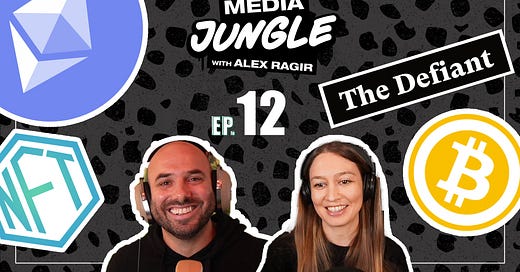Subscribe to Apple Podcasts, Spotify, Google Podcasts, Stitcher, and everywhere you listen to podcasts (if you like the show, leave us a review!). Not much time? Watch short clips on TikTok, Instagram, and Youtube.
Welcome to new subscribers from Committee To Protect Journalists, CNN, Vox, Harvard University, Bloomberg Media, Oneof.com, Report for America, and more. Simply reply to this email with feedback or comments!
Also, the best way people discover this newsletter is through a friend or colleague. Please consider sharing Media Jungle with someone interesting in learning about how the media industry works, and where it’s going.
We also highlight entrepreneurs and pioneers building sustainable media businesses. In that spirit, this week’s episode I’m joined with entrepreneur and former colleague at Bloomberg News:
Camila Russo (@CamiRusso) — Chiefess at The Defiant, a newsletter covering crypto and decentralized finance, and author of The Infinite Machine: How an Army of Crypto-hackers Is Building the Next Internet with Ethereum.
Watch full episode/clips and subscribe to our Youtube channel here:
Below is a transcript of this episode:
Alex: Welcome to the Media Jungle video podcast. I'm your host, Alex Ragir. Coming to you every week to break down the business behind the news industry, the future of media, and the creator economy. Subscribe to our Substack newsletter and our YouTube channel, and don’t forget to leave a review on Apple Podcasts if you like the show. We appreciate the support. On this week's episode, we have none other than Camila Russo, who built one of the most game-changing media publications covering crypto and decentralized finance. I worked with Camila in a previous life when we worked as foreign correspondents in Latin America for Bloomberg News.
WHAT IS DEFI?
Alex: What do you think differentiates The Defiant in the way that you cover crypto and why do you think you've had such success in growing the audience and attracting subscribers?
Camila: So I left Bloomberg in January 2019 to finish writing The Infinite Machine, my book on Ethereum that I published in 2020 with HarperCollins. And in that process of researching Ethereum, I saw decentralized finance emerge. I realized this is the biggest thing happening in crypto. I think it's the biggest thing happening in finance. Like the financial system is being rebuilt using open-source technology and smart contracts, and nobody's paying attention. Not even crypto media was covering it. So, my approach to The Defiant was to cover DeFi using Bloomberg standards. Just covering professionally, objectively. I don't want to be a cheerleader. I just want to tell what's happening, interview sources first-hand, look at the data, do what I had been doing at Bloomberg for the past eight years, but for DeFi with my own newsletter. And people liked it, and that's how it started to grow.
Alex: So you took it very serious when a lot of people in the crypto space are just really cheerleaders talking about "we're going to change the world. Let's have a DJ party." Because a lot of times when I talk with people at crypto, I'm like, "What do you do? What's your business model? What's your product?" and they just don't have anything to say. A lot of it seems like it's a lot of fluff and it's not like a lot of the people who did it do not necessarily come from the tech world, do not necessarily come from the finance world, and they like the idea of starting a revolution, but it doesn't seem like there's a lot of substance in a lot of things.
Camila: That's what I like about DeFi is that the substance is there. So I covered crypto in 2017 and that was all fluff. The ICO market was just tokens playing around with maybe a website on a white paper, but nothing there. DeFi was the opposite. In 2019, there were tons of working applications with users with volume, and many times they didn't even have a token. So it was the opposite thing going on.
Alex: For the audience, in a few sentences, what is DeFi?
Camila: DeFi is decentralized finance. It's the ecosystem of financial applications being built on open blockchains like Ethereum. So what these financial applications do is they automate financial transactions and they take out the need to have third parties and humans in the equation. You take out the need of financial institutions. You interact directly with programs, with computer code being run autonomously and on a blockchain, which means it's open-source, but anyone can verify transactions and see what's happening. It's not MasterCard or Visa because you're not giving away your assets to a third party. You're always in control of your assets. So you're not asking an institution to take your money and do whatever they need to do with your money. You are transacting directly with a computer program and you're never seeding custody of your assets and giving away your information. You never log in to DeFi applications, you're just directly transacting with these applications. It's really seamless, it's global. That's the other thing: when you're transacting in the U.S., you're in this self-contained financial system. And to do anything outside of the U.S. You need a bank account in a different country, you need to wait five business days for international transfers, pay like 50 bucks, but DeFi is a global financial system. So it doesn't matter where you are. And everyone can access it.
Alex: And in some places like Argentina and other places, it's even harder to move money outside the country and inside the country.
Camila: In DeFi, for example, someone in Argentina can have access to dollars. They can buy a stable coin that is a cryptocurrency picked to the value of the dollar, and not only that, they can access a lending platform where they can deposit those stable coins and start earning interest on dollars. Imagine that for an Argentine, that's mind-blowing. Or for a Venezuelan. [Even] someone in Cuba can access DeFi.
Alex: So this sounds like what I think most people know of Bitcoin, which kind of acts like a currency, right? You can take money in and out. That's the decentralized finance part?
Camila: So Bitcoin was the first cryptocurrency, it's the first blockchain, and it's one of many digital assets. Right now, Bitcoin is very volatile, so it doesn't serve that purpose that I was saying before, like someone in a country that has very high inflation. Maybe they can use Bitcoin as a store of value, but they'd be better off probably using a stable coin, like a U.S. dollar stable coin than Bitcoin. And that's what this new financial system evolved after Bitcoin. It takes Bitcoin's innovation further. So Bitcoin was kind of the first blockchain innovation. Ethereum and all the DeFi applications being built on it and other smart contract platforms take that initial step further and give it more functionality. So the reason why it can do that is because Bitcoin is built very simply. It's a network that allows the transfer of value, but it doesn't allow much else. Ethereum and others might contract blockchains like Solana, Avalanche, and Near, allow for programmable money, which Bitcoin doesn't allow. They're what's called smart contracts. So instead of just running money transfers, they run computer code. Whatever code you throw at it, you can build applications on top of Ethereum and these next generation blockchains. And that's what enabled DeFi to be, which couldn't be done on top of Bitcoin.
Alex: You kind of got lured to this while you were in Argentina. The place is very in-stable and has inflation issues. That makes total sense that finding some other system would work for them. Is DeFi good for the U.S.?
Camila: For sure. So, I mentioned the use case of someone in Argentina putting stable coins in a lending platform and getting 5% interest on that. That's really attractive for someone in the U.S. who's getting like 0.1% on their savings. They can also go to a DeFi application, buy stable coins and open a 5% interest rate savings account. And not just that, every kind of money transaction is more seamless. Like I said, you don't need a login. You don't need five different financial apps on your phone anymore. You can just directly log in to this system. Applications that we know and use in traditional finance, they're being rebuilt in this new system, but new applications that weren't possible before are also emerging. Like last year there was this big NFT boom. That's something that just wasn't possible before in the previous system, the ability to have digital ownership of digital assets. Like before, you have a JPEG file or an MP3 that's reproduced millions of times.
Alex: I know how to do it. You just right-click, save. That's how I do it. That's how I do it. That's an NFT. [laughs]
Camila: [Laughs] Not really. It's non-fungible. In the same way that you can take a picture of the Mona Lisa: you can take a picture, but you don't really own it. This innovation allows actual ownership, provable ownership of digital assets, of something that you couldn't have ownership of before. It's allowing artists and content creators everywhere to monetize their work for the first time. This is like the intranet of value that we're seeing emerge right now.
Alex: A lot of times when a new asset class or a new type of thing emerges, it starts off like a revolution, and then the big money moves in and it becomes normal. Right now, you see a lot of institutional investors, hedge funds, et cetera, moving in. Does that just mean it becomes regulated and it becomes another way of doing the transactions and similar things that we see now?
Camila: That's a good question. I think right now the big money is moving into Bitcoin. You see all the big hedge funds and money managers just adding Bitcoin to the portfolio. They haven't come into DeFi yet, but I think it's a matter of time, and regulators are still kind of grappling with what to make out of this system because a big requirement for regulation is for money services to perform KYC AML. And like I said, The C5 applications simply don't collect data. So it's not that they won't do KYC AML, it's that they can't do it. That's an issue that regulators are still struggling with right now.
Alex: I think on the regulation front, a lot of the big proponents of crypto are the ones who are going to benefit the most from crypto. A lot of the big billionaires who are tweeting and saying that they liked this crypto or that crypto, they own that crypto. So it's not the first time that they have a big way to affect the market and their upside is going to be so much bigger. So there is sort of a Ponzi scheme where the first people that were in are just going to benefit the most. So it makes sense that they're going to say this is going to change the world. Is that concerning?
Camila: If you're equating crypto to a Ponzi scheme because investors are pumping their bags, that's the same thing that's happening in the stock market. Crypto is a Ponzi scheme as much as the stock market is a Ponzi scheme, I would say. Of course, investors are shilling their investments, but that happens with all investments. I don't find that to be any different than in any other market.
BUILDING A CRYPTO MEDIA COMPANY
Alex: You were reporting on crypto, you wrote a book about Ethereum, and then you started this newsletter. Talk to me about how that was in the beginning and how you started to build an audience and how you got the confidence to go off on your own.
Camila: The newsletter just started to grow very organically. At first, it was supposed to be a side hustle to what I thought my main job would be as an independent freelance writer. When I finished my book, I just decided to go all-in on The Defiant because I saw the potential there in both the DeFi space and in what I was offering. It just grew very organically. People started recommending it, I added the podcast to it, partnered with a video producer who started leading my YouTube channel, and continued growing The Defiant from there.
Alex: How many subscribers?
Camila: I think had over 2000 subscribers.
Alex: Was that easy, starting to ask people for money? As a reporter, you're making this transition, how was that psychologically?
Camila: Asking people for money wasn't the hard part. It was just more like having my own content out there without the oversight of anyone. That was a bit scary at first. And also having my name out there without Bloomberg attached to it.
Alex: Imposter syndrome.
Camila: Yeah that was the hardest part starting off The Defiant. Being on my own, not having any editors, not having the Bloomberg name. I was wondering whether people would trust me, and they did. After getting 2000 subscribers, I opened the paid subscriptions and started gating some of the content and people were willing to pay for my content. That was super cool.
Alex: I'm sure there's a lot of Substack journalists and reporters too who are also looking at making that transition into video and audio. How was that for you? Cause at Bloomberg you were very much a written reporter.
Camila: The podcast just happened pretty naturally. I started doing weekly interviews for the newsletter and I was recording them. So I was like, "I'm already doing this. So I might as well turn it into a podcast in the end. I still struggle. My main comfort zone is writing. I don't love talking in front of a camera, like now, or like interviewing in front of a camera [laughs]. I don't think my talent is on talking. I think it's more writing. But I've evolved and learned and I'm hopefully getting better at it. I enjoy doing the interviews, but I don't think I'm the best on-air person. But I try and do my best.
Alex: It’s interesting that your differentiators can’t give a clear answer, as if there’s something for them to gain. Everyone's like "buy Ethereum." And it's like, "oh, is cause that, cause you own Ethereum?" And then you meet someone from Bitcoin, they're like "buy Bitcoin." It seems like there are so many cheerleaders that you're like the anti-cheerleader.
Camila: Yeah, I can't stand cheerleaders. YouTube channels that are shilling crypto and telling people to buy stuff, that's not us.
Alex: Are you critical of a lot of things in crypto? I know at Bloomberg they often pushed you to be critical of some of their biggest clients like JP Morgan or Goldman Sachs. Is that something you do? Are you, do you guys write hard-hitting critical things about crypto or it's just too nascent that it's not even fair to do that?
Camila: It’s definitely fair. Like whenever there’s something wrong or off, like a scam or a hack or regulatory issues. We cover everything, we cover the good and the bad. I think we can do a better job at holding people accountable and just doing more investigative reporting like uncovering dirt. That sort of reporting we haven’t done.
Alex: Are you saying dirt in the metaverse?
Camila: Yes, digital dirt [laughs]. I definitely want to do more of that. We haven't done it because there are just two reporters and we're trying to cover the bases. So there's not much room for investigative reporting. But it's not because there's an editorial line. We want to go there. So for now, we've been covering the good and the bad. The next step will be to really dig deeper and uncover digital stories.
Alex: We covered in this show the ConstitutionDAO. What's your takeaway after seeing what happened there?
Camila: There's so much potential for doubt for decentralized organizations. It's like people banded together behind that big concept and a big idea. They were able to raise millions of millions of dollars in a couple of days. Thousands of people from all over the world pulled capital from all over the world in just a couple of days. I think that would have been very hard to do.
Alex: But then a lot of people lost their money. Gas fees rose. There were all these kinds of issues in the execution in the end.
Camila: Yeah, we're super early. Nobody's going to argue that this is the end state of crypto. There are a lot of tech and UX issues to be improved. The good news is that there are very smart people working on layer two solutions and scalability solutions that will make transactions a lot cheaper. These solutions are live right now. It's not like it's some vaporware like empty promises. These scaling solutions are live and working. I think that's part of the takeaway. The potential is huge and it's proven that these are ways to coordinate people and capital very efficiently. But there's also a lot of improvement to be done in the execution and specifically on transaction costs and scalability issues with Ethereum, and those are super well known and they're being worked on. So I think it's a matter of time.
Alex: You were a journalist in Argentina for a long time. I'm sure for a lot of people that sounds like some mystical kind of job. Can you share with us the biggest mistake that you did when reporting? What was your biggest fuck up in journalism basically? [both laugh]
Camila: I remember one time that I had finished the credit column. It was done, dusted, edited by the end of the day. I realized I had done this very stupid mistake of not realizing the terminal was in pesos and not dollars. And it was like the key to the story. Some bond investments were the biggest in X, I can't remember, but the main crux of the story, I had assumed it was in dollars, and it wasn't.
Alex: So the whole case that you made didn't even make any sense?
Camila: Yeah. I remember just like calling Papa [David Papadoupolous, managing editor of markets at the time] being like, "Oh my God, I fucked up," [laughs] and we worked it out.
Alex: My biggest fuck up was in Rio de Janeiro, I had moved to become the economics reporter and I had to go cause back then they didn't have automated economic data. So we would go and we would have to turn a page in a group of 10 different reporters and they'd time off. They go 10, 9, 8. And we turn the page and I have to say "5.6! 5.6!" on a cell phone, and it was the first time that I was told to do this. And this is like people automatically trade millions of dollars on the Bloomberg terminal, depending on if it's above or below expectations. So I was on it. I turned the page, I saw 5.6 and I was like, "4.6, 4.6.!"
Camila: Oh my god, no. [laughs] Were you able to take it back right away?
Alex: After that, I was like, "don't send it out. Don't send it out," and then they didn't send it out. In the end, we changed it and we were like a few seconds behind cause they count people off on three seconds. So I made it, and then I started doing sort of meditational things and became the best at turning the page. The best financial monkey.
Alex: So you got turned on to crypto in Argentina because there's a big crypto space out there, or because it's the instability of the country makes it more prone to want to embrace crypto?
Camila: I think both. It was 2013, Christina Fernandez was in her second term, inflation was out of control as it always is over there, and she had just implemented the harshest currency controls since the 2002 default. At the same time, Bitcoin was in a huge bull market. So in 2013, Bitcoin crossed a hundred bucks for the first time, and then it crossed a thousand. As there always is with a crypto bull market, interest in crypto stories. Do you know Rodrigo Orejuela?
Alex: Yeah.
Camila: He was in Spain at the time. He had his network in Argentina and he messaged me and said, "Hey, I'm hearing about this thing, like this digital money Bitcoin. It's becoming popular in Argentina." So I was like, "oh, that's interesting." And so I went and checked it out and that's how I pitched the first Bitcoin story that I ever wrote.
Alex: [When you transitioned as an entrepreneur,] were there any transferable skills, and on the other side, what was difficult to make that transition?
Camila: It's a steep learning curve. I don't think many skills are good that you can take from reporting to building a business. It helps to tell a story and know how to tell a story, communicate a message, that helps for selling your business, selling it to your audience, to investors. Storytelling is a very undervalued skill and talent, and that's helped me a lot in building the Defiant for sure. But other than that it's been a huge learning experience managing a team. I had never done that before. I wasn't a team leader or an editor at Bloomberg. I was just on my own reporting on stuff, and now I'm managing a 17-person team in different areas, not just reporting. I think that's probably the biggest skill that I had to learn hiring, finding the right talent, managing people. And it's been really fun. I really enjoyed building up the Defiant from scratch and having people on board and getting people excited about my dream. So yeah, from reporting, I think not many people realize how valuable storytelling is. So I think we writers are very lucky to have that.
Alex: Yeah, and in journalism, you always like try to see cut through the crap and you see through the sales pitches and that type of stuff, how do you make that transition to actually sell and feel good about it?
Camila: That's another great skill. Being able to cut through the bullshit. I get so many sales emails for The Defiant and PR pitches for it as well. And I feel like I'm super well-trained to know what's good, what's bad. What's fluff or not. So that's been very useful. My business is content, so, for me, I focus on making content that people want to consume. That's my sales pitch. So it's not so much about going out there and selling The Defiant as a business. The time that I had to do that was when I raised money. So I raised 1.4 million seed rounds between the end of 2020 and I closed around the beginning of 2021. And that was when I had to do sales with a deck. That was fine. It was just like showing people what I had done, telling people about my vision. Some people were like, " you're juggling too much,” because I want to do a data platform too. I am building a DeFi-focused data platform, like the Bloomberg of DeFi. And the main concern investors had was like, "You're doing too much. You want to do a data platform, you have the content, you have the newsletter, the podcasts, the video, and you want to do data. You've never built a technical product." I was like, "Yeah, I'm doing everything. I'm doing everything like you either trust me or you don't." [laughs]
Alex: How was it as a female entrepreneur, especially in the finance space, which is very male-dominated. Did that create any extra challenges?
Camila: I was pretty lucky. I can't say that it has, but at the same time, I don't know what it would have been like as a male. Maybe I would have been very cocky and doubled my evaluation and maybe raised a lot more money. I don't know. So who knows? But I'm happy with how things have turned out. I got a bunch of people to invest in me and trust me and have hundreds of thousands of people who tune into the Defiant every week. I see a lot of just bro-ism and misogyny on Crypto Twitter but I kind of tune it out. Before I used to get comments on interviews about my appearance, and that annoyed me because it's, I'm talking about DeFi and finance and all this stuff and who cares what I look like? Now I don't get that anymore. I don't know if it's because I've aged and people don't focus on that or [laughs] maybe they respect me. It's happened so much throughout the years that I think I've learned to tune out all of that stuff to the point that it doesn't bother me.
Alex: What advice would you give someone who's working at a big news organization? Who's going to move and go on their own to Substack or wherever it may be?
Camila: I encourage everyone to go for it. I think it's extremely fulfilling to be on your own and running your own kind of mini media company. I think for me, the thing that worked well is to be constant and consistent. Show up every day, hopefully around the same time, with similar quality of content and then people start to get used to you and expect you, and they want to see your email in their inbox. Pick a frequency that you think you can keep up with, pick a topic that you won't get sick of, explore your voice because people also want that personal connection. That's something I had to work on. Have my own voice and strip out all the Bloomberg stuff and dare to have my own kind of analysis and sometimes opinion on things. People really value that. I'd say pick a topic that you're passionate about, diving very deep and becoming very specialized, show up at the same days and times and let people know to expect you and to trust you. And then find your unique voice and way of covering that topic.
Alex: Great. There you have it. Thanks so much, Camila. It's great to see you again, and thanks for joining.
Camila: Yeah, this was fun. Thank you so much for having me!














Share this post